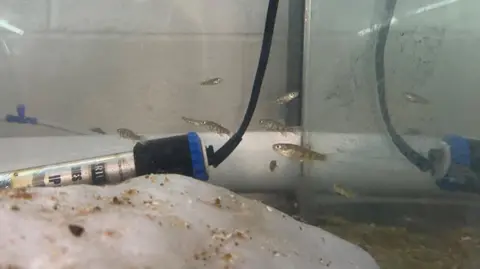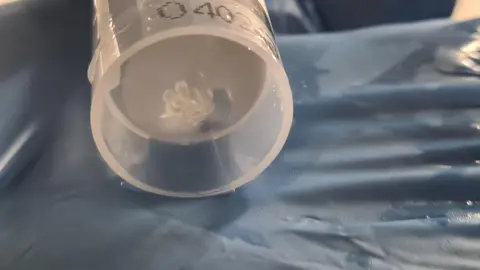Rare fish species successfully hatched at zoo
 Bristol Zoological Society
Bristol Zoological SocietyEggs from a rare Mexican fish species believed to be extinct in the wild have successfully hatched at Bristol Zoological Society.
Experts at the charity took delivery of more than 50 boxer pupfish eggs before Christmas, from Whipsnade Zoo, as part of efforts to safeguard the species.
They have now hatched and are thriving.
Tamara Canalejas at Bristol Zoological Society said: "The insights we have gained from these recent egg transfers have been incredibly valuable for planning future shipments to establish new viable populations."
 Bristol Zoological Society
Bristol Zoological SocietyMs Canalejas added: "This really is a triumphant milestone in freshwater fish conservation."
At just a few months old, the fish are still very small, measuring no more than a centimetre long.
Boxer pupfish, Cyprinodon simus, are one of seven pupfish species native to Lake Chichancanab in Mexico.
However, concerns about their existence are growing as surveys have not recorded a population there for more than two years.
Researchers believe this population destruction is down to the introduction of invasive fish species, such as the Mayan cichlid.
Working closely with Whipsnade Zoo in Bedfordshire, where the only other known population of Cyprinodon simus previously existed, this new breeding programme is crucial for the conservation of this extremely rare species.
Brian Zimmerman, director of conservation and science at Bristol Zoological Society, said: "By strengthening the numbers of the boxer pupfish across more than one institution, we will ensure that the species survives, even if it is lost in the wild.
"The next step in the programme will be to introduce juveniles from Whipsnade and begin breeding between the two collections.
"We aim to increase our numbers to at least 100 and maintain a stable population."
Follow BBC Bristol on Facebook, X and Instagram. Send your story ideas to us on email or via WhatsApp on 0800 313 4630.
